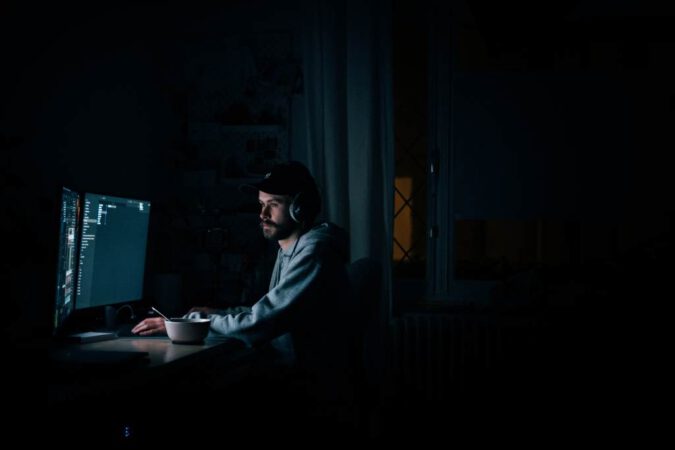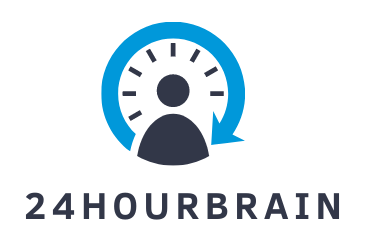You have an important presentation deadline coming up, an exam the next day, or do you need to deliver the program code for the software the next day?
This situation begs the following critical question:
When you have to pull an all-nighter, how do you stay productive and focused? Here are some pointers to help you stay productive until the morning.
Is It Even Possible to Work Productively and Concentrate at Night?
One thing is certain: working at night is not part of our chronobiology. When the sun shines, humans are wired to be awake and productive! According to studies, working at night has a negative impact on our health!
Furthermore, productivity and creativity are lower at night than during the day. The reason for this is built into our bodies. The hormones that are released during the night phase are meant to help you sleep and rest.
Your body gets upset if these cycles are messed up and you have to do something intellectually or physically right away.
As a result, be aware that you will not perform optimally during a night shift. If you must work a concentrated night, the following suggestions will assist you!
Make a Goal List!
It is critical that you know exactly what you want to achieve before beginning your evening activity! Write it down precisely and visualize the end result. If you do not do this, you risk losing the thread.
Separate Your Work Into Packages
Make small work packages that you can work on one at a time throughout the night. This makes you feel better because you can see your progress and stay motivated.

There Is No Such Thing as Perfection in Night Work.
As previously stated, you are not as creative and focused at night as you are during the day. Work in accordance with the 80/20 rule. Ensure that you achieve the entire goal, if not perfectly, but at least 80% of the time.
It will most likely be impossible at night. However, the following method can help you achieve at least some of the missing 20%.
Before You Begin, Take a Deep Breath
Before you begin working, take a moment to relax. Perform breathing exercises to best prepare your mind and body for the upcoming activity.
It is pointless to approach such a difficult task with nervousness and excitement.
Make a Night Work Schedule
Assume you begin working in the evening and know you must be productive until late at night. Your deadline is 9:00 a.m. the following day. Then make a plan for yourself:
For example, suppose you begin at 10:00 PM and have previously described your goal and formed packages. Consider how much time you will need to devote to each package in order to achieve the 80% quality.
This will also give you an idea of whether or not you can achieve your goal. Let us also assume that you are able to process all packages until 5 a.m. Then, from 5 to 7 a.m., lie down and rest! Set your alarm clock for 7 a.m.
After waking up at 7 a.m., go over all of the packages again and make notes on what needs to be improved to get the remaining 20%.
Work until 8:00 on improvements and corrections. Complete all of your work and get ready for the day. The basic idea behind this method should be obvious.
This method provides you with a tool for controlling your work and the quality you want to achieve.

Drink Plenty of Water and Green Tea
Caffeine may be appealing, but a recent study suggests that you should instead drink water. Evening productivity can increase by 14 percent. The study discovered that water helps increase gray matter in our brains, which is important for increased productivity.
Green tea contains teein, which enters the blood slowly and has a stimulating effect over time. Caffeine in coffee, on the other hand, quickly enters the bloodstream and stimulates it. However, the effect is short-lived. Never drink sugared soft drinks!

The Brain Requires Energy
Our brain is one of the most energy-intensive organs in the body. If you are working after midnight and are hungry, reach for something easily digestible, such as fruit (bananas). Fruit’s fructose provides energy for your brain. Stay away from energy drinks and soft drinks!
Check That You Have Adequate Lighting
Blue light has been shown in studies to influence our inner rhythms by providing more mindfulness and energy. Our body’s natural energy level is determined by our internal clock. We can provide an energy boost by using blue light.
Take a Refreshing Shower
This may not sound appealing, but studies show that taking a cold shower can boost our energy levels, help regenerate muscles, and make us feel refreshed. The cold water irritates your body, making you feel more alert and awake. That works even after midnight.
Get Moving! Take Short Breaks between Work Packages!
Taking regular breaks before beginning work on a new package or section has been shown in studies to increase productivity.
Stand up for 5 minutes at a time to take a break. Stretch and walk up and down a few times, then do some squats. This will stimulate your circulation and deliver more oxygen to your brain.
Clean Air
When working at night, make sure you get plenty of fresh air. Bad and stale air causes fatigue and makes it easier to lose concentration. If possible, open the windows during short breaks and take a few deep breaths.

Distractions Should Be Avoided
As previously stated, it is difficult to remain productive and focused at night. As a result, concentrating on work becomes even more critical. The radio and television should be turned off, as should the smartphone.
Under no circumstances should you allow social media to distract you. Facebook, Instagram, and the like are nice, but they don’t help you with the task at hand and instead drain your energy and concentration.
Optimize Your Workplace Environment
You don’t have time to look for important documents if you have to work at night, especially after midnight. Prepare everything you need for implementation if you have defined your goal and work packages as described earlier. This will save you time and allow you to concentrate on your work.
The Following Day
It is time to rest after you have presented or submitted your work. You should sleep for a few hours after that, until you are halfway rested. But not for so long that your normal wake and sleep cycles are disrupted.
Conclusion
Working after midnight should be a rare occurrence. If this occurs, the suggestions above can assist you in remaining productive and focused at night. It is critical that you remember which of these suggestions worked best for you and which you should consider more seriously the next time.


